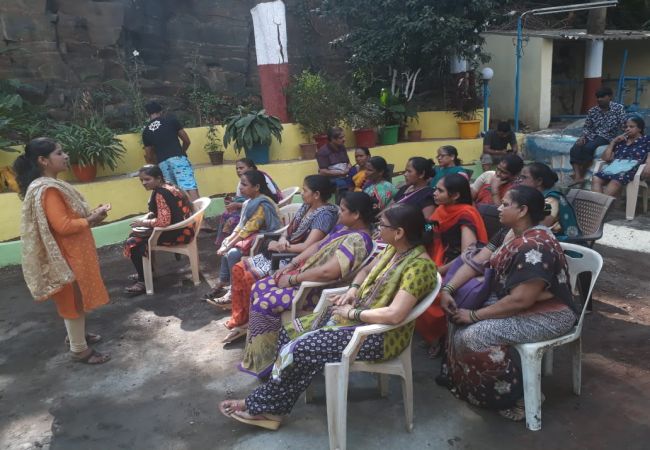Mumbai: It has been 16 months since the Brihanmumbai Municipal Corporation (BMC) had mandated on-site treatment waste in housing societies of Mumbai producing over 100 kilos of garbage and even today close to 50 per cent of them do not practice it. One of the main reasons cited by many buildings is the lack of space to install a composting unit. A similar reason along with lack of willingness on part of the residents was deterring the Greenfield Rocks End Housing society located at Jogeshwari Vikhroli Link Road to manage their own waste. However, regular notices from BMC to treat their waste compelled the residents to find a solution.
Also Read: This 40-Year-Old From Mumbai Quit His Well Paying Job To Produce Fuel From Kitchen Waste
The residents approached the Solid Waste Management department of BMC and a few NGOs working in waste management in August 2018 to get suggestions and learn the process.
When we told our residents about the BMC notices, they were not keen on practising the composting. So, we called the BMC and NGOs who gave us a demonstration. Another problem was the space issue. The residents wanted to install the unit at a place where it would not be easily seen to maintain the beauty of the complex
-Dr Rahul Chavan, Secretary of the Greenfield Rocks End Society tells NDTV.
Also Read: Keep Mumbai Clean And You Might Just Get To Attend Singer Guru Randhawa’s Music Concert
On inspecting the premises of the building, the BMC identified a potential area for the unit. It was nothing less than dump yard created over the years by residents themselves. Close to 15 trucks worth of garbage was cleared from the area.
The composting model installed at Greenfield is a replica of the model at Cooper Hospital, Juhu. Subash Dalvi, Chief Nodal Officer of BMC had helped the hospital to manage the waste by installing vermi-compost pit. In vermicomposting, earthworms start eating the waste materials and give in return a smart byproduct which is called manure.
The model at Cooper Hospital is getting a thumbs up from several stakeholders across the city and many of the bulk generators have replicated this model. The Greenfield society got the benefit of the dumping yard to tackle the space issue. The residents were quite excited when the model was launched in October last year. Now, it is yielding positive results, Mr Dalvi tells NDTV.
The housekeeping staff was trained by the Aastha Mahila Bachat Gad, a self-help group and BMC. Meanwhile, the residents though agreed for the unit were skeptical about its hygiene and cleanliness.
The plant at Cooper Hospital is safe and doesn’t produce any smell. It requires less maintenance. The best part of the designs is that worms don’t have to be separated from the compost manually. They leave the compost pit and go to another pit once the material is fully decomposed, says Mr Dalvi.
Also Read: After Versova Beach Cleanup, Afroz Shah Eyes Mithi River In Mumbai To Make It Waste-Free
There are 412 flats in the society that generate approximately 300 kilos of wet or bio-degradable waste daily. All the wet waste is deposited in the composting pits. That waste is then mixed with cow urine or cow dung and for 10-15 days is left untouched so that the waste can decomposed to some extent.

There are 412 flats in the society that generate approximately 300 kilos of wet or bio-degradable waste daily
In the second step, comes the role of Vermi-composting. After 10-15 days, when the waste gets half decomposed, it is added to the especially designed compost pit which is called smart vermi-compost pit. There are 5 smart vermi-compost pits – three on one side and two on the other side. The compost pits are low in height and longer in width and is made using bricks. The top layer of the compost pit is covered with a net to protect the manure from birds and other insects. Whereas, the bottom one foot of the pit is covered with water and earthworms. The design of these pits is made in such a way that all the pits are connected to one another.
On alternate days the half-decomposed material is added to these smart vermi-compost pits along with water. So, basically what happens is that the earthworms start eating the waste materials and give in return a smart byproduct which is called manure. The waste takes about 45 days to decompose and turn into manure that is rich in nutrients. The manure is then used in society’s gardens.
NDTV – Dettol Banega Swachh India campaign lends support to the Government of India’s Swachh Bharat Mission (SBM). Helmed by Campaign Ambassador Amitabh Bachchan, the campaign aims to spread awareness about hygiene and sanitation, the importance of building toilets and making India open defecation free (ODF) by October 2019, a target set by Prime Minister Narendra Modi, when he launched Swachh Bharat Abhiyan in 2014. Over the years, the campaign has widened its scope to cover issues like air pollution, waste management, plastic ban, manual scavenging and menstrual hygiene. The campaign has also focused extensively on marine pollution, clean Ganga Project and rejuvenation of Yamuna, two of India’s major river bodies.



































Chirag Yadav
June 17, 2020 at 4:52 pm
hello sir i want to make vermicompost pit so please tell me about this . bcus i’m secretary of 1 society … so please tell me .
Naresh
June 1, 2021 at 12:36 pm
Sir, Is there any restriction of distance for this Vermicomposting plant to install from the houses…bcos it may cause mosquito and other monsoon dieses